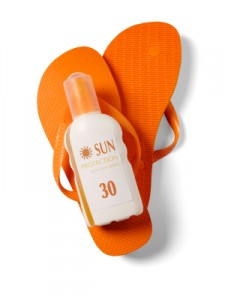What is SPF Skin Care?
 SPF is defined as the sun protection factor, which is how well a sunscreen protects your skin from damaging sun rays. The higher the SPF, the better it is for your skin against UVB, or ultraviolet B, rays.
SPF is defined as the sun protection factor, which is how well a sunscreen protects your skin from damaging sun rays. The higher the SPF, the better it is for your skin against UVB, or ultraviolet B, rays.
SPF skin care is using the correct products for your skin type that are meant to protect your skin from the sun.
Finding a Product
To being your SPF skin care, you must first find a skin care product that contains the correct amount of SPF. The higher the SPF number, the better it will be at protecting your skin against UVB rays. It is also important to get protection from ultraviolet A, or UVA, rays as well, as UVA rays cause skin aging.
The level of SPF that you choose can be determined by the length of time you spend in the sun or even by your skin type. Fair-skinned individuals should use more protection than darker skinned people as the damaging rays can penetrate their skin more rapidly.
Using a sunscreen more than once a day will provide you with a more overall coverage as sunscreen will need to be reapplied if you get wet, or even from sweating.
Benefits of SPF Skin Care
Daily SPF use is just as important as using a sunscreen with the correct SPF protection for your skin type. Daily use will decrease your chances of skin cancer, but only if you are using a proper amount of protection such as SPF 15 or higher. Depending on your skin type, it may be more beneficial for you to use increased amounts such as SPF 30 or even SPF 60 for full coverage, long-lasting protection.
Along with SPF sunscreen, applying SPF moisturizers can benefit your skin by keeping it looking young and radiant. The risk of sun spots become less of a factor since SPF provides an added layer of protection. That added layer also hydrates your skin, which can stop it from cracking from dryness and also from forming wrinkles and age lines. This is sometimes referred to as photodamaged skin.
If you suffer from acne-prone skin, you should use an oil-free, non-comedogenic SPF sunscreen that won’t block your pores. If you are using a topical acne treatment, it is best to wait at least 20 minutes before applying a sunscreen over that treatment. Also, some sunscreens can irritate your skin so it is best to use the proper sunscreen for your skin type.
The best way to protect your skin from the damaging rays of the sun is by knowing the ins and outs of SPF skin care. You should use separate sun protection products for your body and your face. SPF products for your face are typically less oily as not to cause breakouts. Noncomedogenic sunscreens and added moisturizers are recommended for SPF skin care.
SPF sunscreen with UVA and UVB protection should be applied daily and in the correct amount for your skin type, with a minimum of SPF 15. Protecting yourself from the sun can help fight the signs of photodamaged skin and cancer, and can give you healthier more radiant skin over the years.
 Spf sunscreens are composed of several chemicals for skin care which give it the characteristic to create a shield on the skin of the body to deflect the harmful sun’s rays giving you good spf skin care. This will help the individual to minimize the exposure to sunlight causing health risks. Following is a detailed analysis of some of the major risks that are caused by the constant use of spf sunscreen lotions.
Spf sunscreens are composed of several chemicals for skin care which give it the characteristic to create a shield on the skin of the body to deflect the harmful sun’s rays giving you good spf skin care. This will help the individual to minimize the exposure to sunlight causing health risks. Following is a detailed analysis of some of the major risks that are caused by the constant use of spf sunscreen lotions. For a long time, many people have been aware of the need to cover from the sun, but not always to the extent that it is done today. Once it was learned that sun exposure could cause more harm than good, and that a sunburn could lead to more damage like cancer, the need for protection vastly increased.
For a long time, many people have been aware of the need to cover from the sun, but not always to the extent that it is done today. Once it was learned that sun exposure could cause more harm than good, and that a sunburn could lead to more damage like cancer, the need for protection vastly increased. There is a spectrum of sun rays that cause a lot of harm to the skin such as skin cancer of melanoma and innumerable less common disease. Besides there are several types of skin the world over. Therefore each skin type reacts in a particular manner with these harmful rays and requires different types of skin care. Therefore
There is a spectrum of sun rays that cause a lot of harm to the skin such as skin cancer of melanoma and innumerable less common disease. Besides there are several types of skin the world over. Therefore each skin type reacts in a particular manner with these harmful rays and requires different types of skin care. Therefore  Sun exposure can be detrimental to the skin and create dryness throughout the skin’s layers and contribute to early signs of aging within the skin. Excessive amounts of natural sunlight can cause the skin to lose the youthful appearance and create fine lines within the skin, additional exposure to skin developing fine lines can contribute to deep wrinkles forming within the skin and the breakdown of collagen.
Sun exposure can be detrimental to the skin and create dryness throughout the skin’s layers and contribute to early signs of aging within the skin. Excessive amounts of natural sunlight can cause the skin to lose the youthful appearance and create fine lines within the skin, additional exposure to skin developing fine lines can contribute to deep wrinkles forming within the skin and the breakdown of collagen. Researching the ingredients used in skin care products and the purposes of various products, like those that can protect against the sun, is a way to ensure that the skin remains youthful through age.
Researching the ingredients used in skin care products and the purposes of various products, like those that can protect against the sun, is a way to ensure that the skin remains youthful through age. Including protection against the sun in skin care products is important, especially for skin care products that are used on the face. Choosing skin care products that contain SPF protection can help to retain the youthful glow and the moisture levels of the skin.
Including protection against the sun in skin care products is important, especially for skin care products that are used on the face. Choosing skin care products that contain SPF protection can help to retain the youthful glow and the moisture levels of the skin.